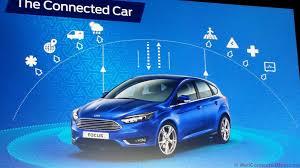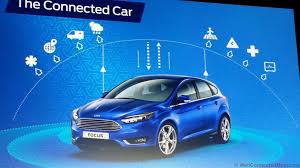
Ford is planning to resort to research in robot communications technology in order to keep its cars connected to the internet - and each other.
To ensure that navigation, internet and automated driving services remain active in tunnels and among skyscrapers the company is researching a proposed car-to-car data-sharing system. It is a common ailment for connected cars that they tend to lose satellite contact inside tunnels and in between skyscrapers.
Data from universities that have extensively studied communications between robots in space is being extensively used in the research by the company. One of the examples of such technology is the controlling of a robot back on earth by an astronaut using a joystick in the International Space Station.
A clear view of the sky to be able to communicate the necessary data via the cars around them to any vehicles in the area that cannot access it directly is the expected results or outcome of the research.
"The challenge of creating a robust wireless communications network is shared between the space and automotive industries," said Oleg Gusikhin, technical leader, advanced connected services, Ford Research & Advanced Engineering.
"These first results are very promising in terms of offering more reliable communications technology for the future of connected vehicles," he said.
Cars that are stricken with poor connectivity toward the satellites can relay emergency messages via other vehicles that are in a better position is another of the key functions of the multi-way data-sharing idea.
On the other hand, Japanese car giant Toyota unveiled its vision for self-driving cars in Tokyo promising to start selling such vehicles in Japan by 2020.
Experts view this as a direct challenge of the company to other automakers as well as industry newcomer Google Inc. who is reported to be in advanced stages of designing a self driven car.
The technology is being called "mobility teammate concept" by Toyota and it was demonstrated on a regular Tokyo freeway. The technology on allows the driver and the artificial intelligence in a sensor-packed car to work together as a team.
A Lexus car changed lanes, braked and steered itself in the demonstration at a speed of 60 kmp (37 mph) for 10 minutes. The person who was at the wheels of the car, had to only turn on a button and start the technology.
The efforts of Toyota are part of a larger Japanese government initiative to pioneer automated driving in time for the 2020 Tokyo Olympics.
Toyota has been toiling with the idea of a self driven car since 1990s but with extreme caution as it was of the view that the idea of a driverless car was unrealistic, even dangerous. This event clearly marks a shift in the policy and approach of the company.
"Our goal is to offer the freedom of movement to everyone, including the elderly and the disabled," said Chief Safety Technology Officer Moritaka Yoshida.
The self driving technology has been boosted by advancement of sensors and telecommunications especially in areas such as a safety measure in hard to execute maneuvers such as parking.
(Source:www. indiatoday.intoday.in & http://home.bt.com)
To ensure that navigation, internet and automated driving services remain active in tunnels and among skyscrapers the company is researching a proposed car-to-car data-sharing system. It is a common ailment for connected cars that they tend to lose satellite contact inside tunnels and in between skyscrapers.
Data from universities that have extensively studied communications between robots in space is being extensively used in the research by the company. One of the examples of such technology is the controlling of a robot back on earth by an astronaut using a joystick in the International Space Station.
A clear view of the sky to be able to communicate the necessary data via the cars around them to any vehicles in the area that cannot access it directly is the expected results or outcome of the research.
"The challenge of creating a robust wireless communications network is shared between the space and automotive industries," said Oleg Gusikhin, technical leader, advanced connected services, Ford Research & Advanced Engineering.
"These first results are very promising in terms of offering more reliable communications technology for the future of connected vehicles," he said.
Cars that are stricken with poor connectivity toward the satellites can relay emergency messages via other vehicles that are in a better position is another of the key functions of the multi-way data-sharing idea.
On the other hand, Japanese car giant Toyota unveiled its vision for self-driving cars in Tokyo promising to start selling such vehicles in Japan by 2020.
Experts view this as a direct challenge of the company to other automakers as well as industry newcomer Google Inc. who is reported to be in advanced stages of designing a self driven car.
The technology is being called "mobility teammate concept" by Toyota and it was demonstrated on a regular Tokyo freeway. The technology on allows the driver and the artificial intelligence in a sensor-packed car to work together as a team.
A Lexus car changed lanes, braked and steered itself in the demonstration at a speed of 60 kmp (37 mph) for 10 minutes. The person who was at the wheels of the car, had to only turn on a button and start the technology.
The efforts of Toyota are part of a larger Japanese government initiative to pioneer automated driving in time for the 2020 Tokyo Olympics.
Toyota has been toiling with the idea of a self driven car since 1990s but with extreme caution as it was of the view that the idea of a driverless car was unrealistic, even dangerous. This event clearly marks a shift in the policy and approach of the company.
"Our goal is to offer the freedom of movement to everyone, including the elderly and the disabled," said Chief Safety Technology Officer Moritaka Yoshida.
The self driving technology has been boosted by advancement of sensors and telecommunications especially in areas such as a safety measure in hard to execute maneuvers such as parking.
(Source:www. indiatoday.intoday.in & http://home.bt.com)





